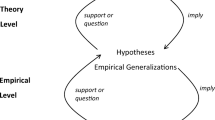Abstract
Scott Sehon recently argued that the standard notion of determinism employed in the Consequence Argument makes it so that, if our world turns out to be deterministic, then an interventionist God is logically impossible. He further argues that because of this, we should revise our notion of determinism. In this paper I show that Sehon’s argument for the claim that the truth of determinism, in this sense, would make an interventionist God logically impossible ultimately fails. I then offer and respond to a weaker version of the argument for the claim that we should revise our notion of determinism.
Similar content being viewed by others
Notes
A similar version of this thesis is sometimes stated differently: if a world is deterministic, then given the past and the laws, there is only one physically possible future. For the purposes of this paper, this difference is not relevant. Generally, when people talk about an interventionist God, they are thinking of a God that can either intervene directly in the physical world, or indirectly, by way of intervening with things that can in turn interact with the physical world. If an interventionist God could make it such that future events are not determined, then a world with such a God would not have only one physically possible future either.
Some allow for indeterministically caused events at the beginning of the universe. If this is so, this necessary conditional would hold for any P after P0, where P0 is just after the beginning of that universe.
As I am using “indeterministic” here, a world is indeterministic just in case it is not deterministic. I take determinism and indeterminism to be mutually exclusive and jointly exhaustive.
I would like to thank an anonymous reviewer for suggesting this objection.
Mackie offers a revision of the SI notion of determinism on which we add to the antecedent of the characteristic sentence a conjunct stating that nothing supernatural interferes with the natural order (1982: 19–20). This revision as well would force us to reject the claim that there is only one possible future, given the past and the laws. Thanks to Taylor Cyr for bringing this revision to my attention.
References
Fischer, J., Kane, R., Pereboom, D., & Vargas, M. (2007). Four Views on free will. Malden, MA: Blackwell.
Kane, R. (Ed.) (2011). The Oxford Handbook of free will. Oxford: Oxford University Press.
Mackie, J. L. (1982). The Miracle of Theism. Oxford: Oxford University Press.
Plantinga, A. (1974). God, Freedom, and Evil. Grand Rapids: Wm. B. Eerdmans Publishing.
Sehon, S. (2011). A Flawed conception of determinism in the Consequence argument. Analysis, 71, 30–38.
Swinburne, R. (1977). The Coherence of Theism. Oxford: Oxford University Press.
Swinburne, R. (1996). Is There a God? Oxford: Oxford University Press.
van Inwagen, P. (1983). An Essay on free will. Oxford: Clarendon Press.
Watson, G. (Ed.) (2003). Free will. Oxford: Oxford University Press.
Acknowledgments
For comments on previous drafts of this paper and discussions about Sehon’s argument, I would like to thank Matthew Flummer, Marcela Herdova, Stephen Kearns, Carmen Maria Marcous, Steven McFarlane, Alfered Mele, Daniel Miller, the audience at the 2013 UF/FSU Graduate student conference, and the members of the FSU Department of Philosophy Writing Group.
Author information
Authors and Affiliations
Corresponding author
Rights and permissions
About this article
Cite this article
De Marco, G. ‘Determinism’ Is Just Fine: A Reply to Scott Sehon. Philosophia 44, 469–477 (2016). https://doi.org/10.1007/s11406-016-9712-0
Received:
Revised:
Accepted:
Published:
Issue Date:
DOI: https://doi.org/10.1007/s11406-016-9712-0




